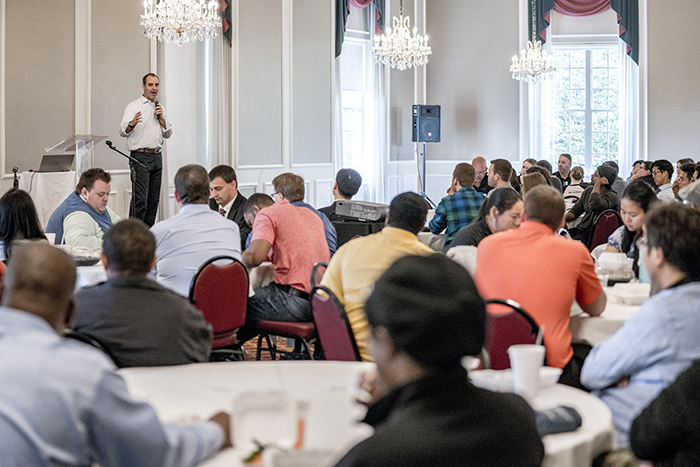Need for Kingdom workers emphasized during church planting week

As the North American Mission Board (NAMB) works toward its yearly goal of planting 1,200 new churches, the need is great and opportunities are abounding. Chad Childress, senior director of NAMB’s Church Planter Discovery Team, spoke to students during a special luncheon, March 28, as part of Southwestern’s annual North American Church Planting Week. He urged them to begin their ministry preparation now and highlighted the vital role the local church plays in planting and multiplying churches.
“If your church is not planting or reproducing as a church, then there are some missiological issues there,” Childress said. He further explained that God may not call them to be church planters, but as students consider their ministry calling, it is important to understand what is at stake and how the local church can be missions-minded.
Childress added that one of the ways students can begin to prepare is by taking advantage of church planting courses available to them now. Southwestern is equipping its students for possible future church planting work in various ways, says Professor of Baptist Church Planting Steve Lee, including courses in church planting, missiology and evangelism. One special opportunity in the near future is a three-hour “Missiological Issues” course being offered in conjunction with the SEND Conference in Dallas, May 19-20, which includes free registration for the conference (see here for more information).
“I would encourage you to get in some of those classes so you can understand what the heart of New Testament evangelism and church planting really looks like,” Childress said. Additional opportunities at Southwestern for field experience in urban church planting contexts include a summer mission trip for college students to Vancouver, where they will partner with existing church planters.
Throughout the years, NAMB has devoted much of its resources to church planting, specifically in the 32 “Send Cities” they have identified as having the greatest needs. Childress said there is a deficit of church planters, so there is a significant need for people willing to go.
Childress challenged students to prayerfully consider how God would have them be a part of church planting, whether that be as a planter, mobilizer, or staff member of a sending or supporting church. Although many church planters do come from universities, seminaries or church residency programs, Childress said the church must not overlook one of the best places to find church planters: their own congregations.
“The greatest fruit for church planting is in your pews,” Childress said. “It is sitting right in front of you, pastor. The pastor must be willing to begin to cultivate that, discover them and willingly develop them.”



